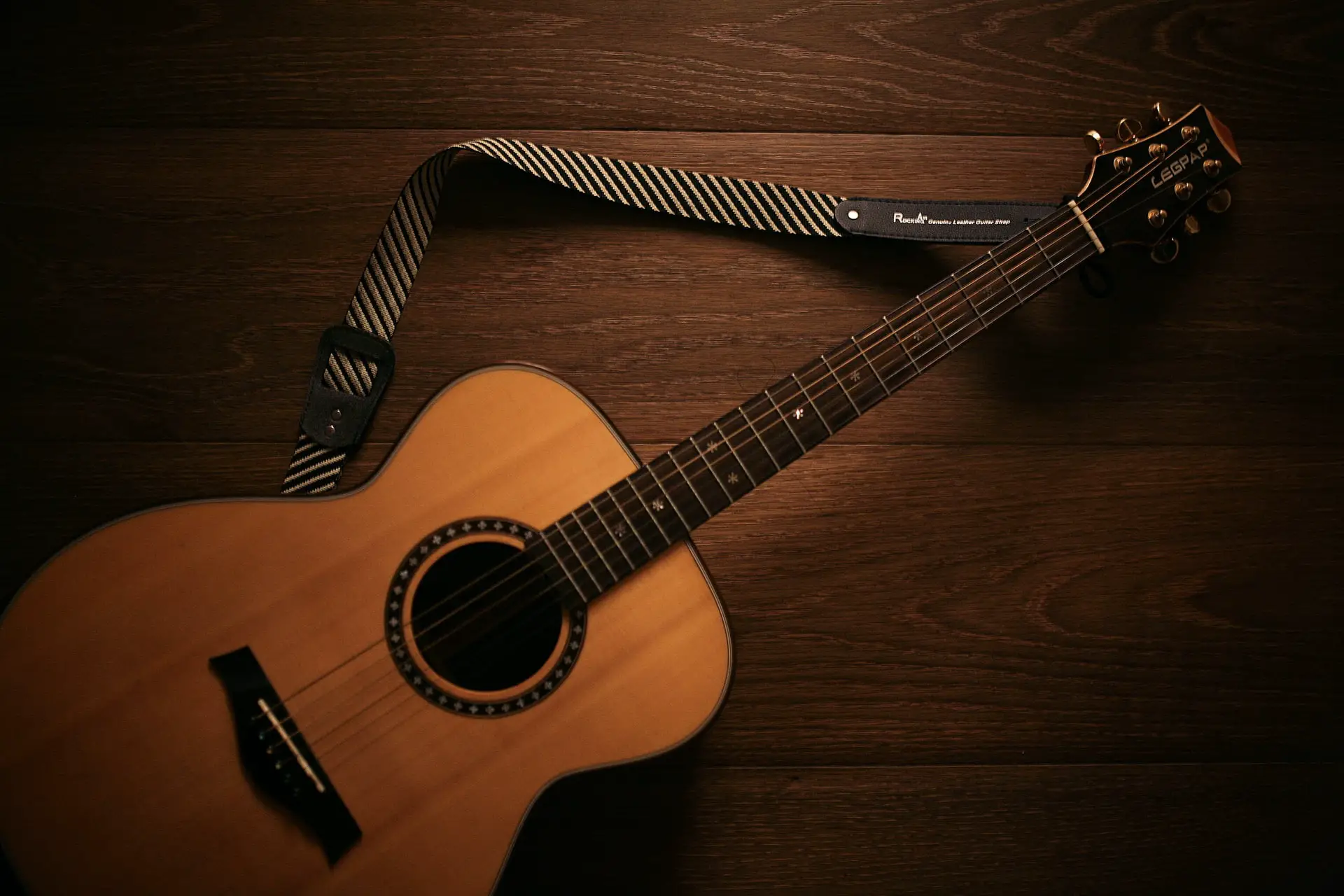Laying guitar flat is not a good way to store your guitar – it’s prone to accidents like stepping or dropping items on your guitar. You are recommended to store your guitar on a stand or case.
When I first started learning guitar, I wanted to find the best way to store it. This leads me into researching multiple forums and trying many of them myself.
In this article, I will discuss the common techniques to store guitar and go into detail in each of them, including below:
- Laying guitar flat
- Learning guitar against the wall
- Hanging guitar by the neck
- Keeping guitar on a stand
- Keeping guitar on a case
6 Reasons Why Laying Guitar Flat Is Bad
Generally, laying the guitar flat (especially on concrete floor) is bad. Below are 6 reasons why laying guitar flat is bad:
- Accidental stepping. Laying guitar flat on the floor is prone to accidental stepping – especially in the dark when going to the toilet at night. Trust me, my girlfriend did this many times to my guitar in the early days.
- Accidental dropping items on guitar. You can accidentally drop common items like phones onto your guitar if it’s laying flat. Don’t underestimate this because dropping items on your guitar can crack its body.
- Concrete sucks moisture from your guitar. With less moisture, your guitar body is prone to crack – especially acoustic guitars.
- Tripping over cable or guitar. Guitar safety aside, you or anyone can trip over your guitar (or cables) and fall over – causing injury. I wouldn’t risk this if I were you.
- Prone to scratches. Guitar laid flat will collect dust overtime – which makes the guitar body prone to scratches when you play it.
- Get dirtier quick. The dust collected on your guitar body will also make it look dirty. Especially if this is a white electric guitar. Worse is, some dust collects on the strings, while some on the body – not pleasant looking at all.
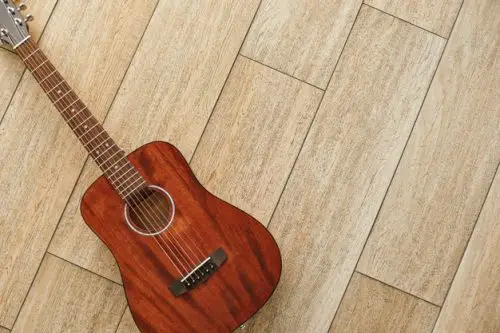
Laying guitar flat on the floor is not a good way to store guitar.
Can You Lean Guitar Against The Wall?
Leaning a guitar against the wall is also bad. After some time, the guitar neck will bend inwards – causing several issues. Not to mention the guitar can slip and call in any moment.
Generally, learning guitar against the wall is the worst way to store a guitar (this applies to all types of guitars).
The biggest reason to not lean guitar against the wall is because the neck can bend inwards if left in that position for a long time.
A guitar with a bent neck will go out of tune, look ugly and just downright uncomfortable to play.
If your guitar has a bent neck, the only fix is to lean the guitar on a wall for the opposite side. Keep it like that until it straightens and never ever lean your guitar on the wall again.
A bent neck only happens if you have leaned it on the wall for a long time, of course. Casually leaning your guitar on the wall for 5 minutes while you go on a quick break is absolutely fine.
Here are 3 complete reasons why a leaning guitar against the wall is bad
- Bent guitar neck. Leaning guitar against the wall for a long period of time can cause the neck to bend inwards. This is bad for tuning and playability.
- Guitar can slide and fall. Guitar leaning against a wall is prone to tipping over and falling – causing minor scratches at best and a cracked body at worst.
- Scratches to the wall. If your wall is light colored, leaning guitar on the wall can easily cause scratches – your mom or girlfriend will not like this (I know).
Can You Hang Guitars By The Neck?
Hanging guitar by the neck is not recommended because the guitar will be affected by temperature and humidity changes and it’s also prone to falling and breaking.
Guitar wood is prone to cracking when exposed to changing humidity and temperature (think of winter time where your room is cold and then hot at night when you turn on the heater).
Hanging guitars by the neck in the open exposes your guitar to these temperature and humidity changes – which can cause your guitar to crack over a long period.
And not to mention, if the guitar accidentally falls from the wall, it can easily break.
Temperature and humidity aside, many people will tell you that hanging a guitar by the neck is not actually bad. In fact, many guitar stores do it (mostly for acoustic, because they are lighter).
The logic to hanging guitar by the neck is that the tension created on a guitar by its strings is higher than the weight of the guitar – which makes it okay.
I am not a big fan of this logic because the tension exerted by the guitar strings is indeed more than the guitar weight – but it’s not a good enough reason to justify why I should add more tension from the weight by hanging it.
If the guitar is already in high pressure due to the string, we should not add more pressure to it by hanging it. What do you say?
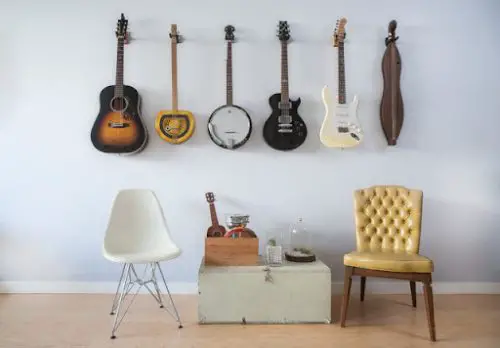
Hanging guitar on the wall by neck is also not a good way to store gutiar.
Keeping Guitar On Stand Or Inside Case: Which Is Better?
The best way to store your guitar is by using a guitar stand or keeping it in a hard guitar case. Let’s look at the pros and cons of each.
Guitar Stand Pros
- Guitar stands are cheap. It costs about $22 for an adjustable guitar stand on Amazon. This is much cheaper than a hard guitar case.
- Easily accessible. Guitars stored on a stand are easily accessible – simply pick it up to play and drop it off when you are done.
- Doesn’t cause any damage to the guitar. For it’s cheap price, a guitar stand is great because it doesn’t damage the guitar at all – no additional pressure is exerted on the guitar (unlike guitar hanger)
- Looks good. A guitar stand is a great way to show off your guitar (or just add a good vibe at your home). It’s definitely a conversation starter when you have visitors.
Guitar Stand Cons
- Guitar stand exposes your guitar to changing temperature and humidity. Using a guitar stand means your guitar is left in the open. Long exposure to changing temperature and humidity can cause cracks in your guitar. I will talk more about how to prevent this later.
- Exposed to outside damage. Guitars sitting on a guitar stand can still tip over if you are not careful. Especially if it’s dark and you don’t see it. This should be rare though – depending on where you place the guitar stand.
- Collects dust. Literally collecting dust when keeping your guitar in the open happens inevitably. Just make sure you play it often and wipe the dust away from time to time
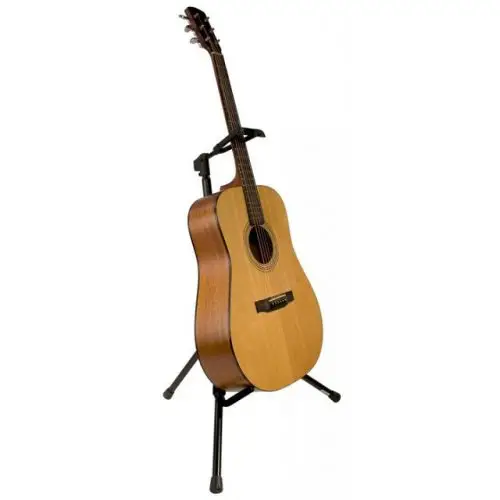
Guitar stand is a great way to store guitar when not in use.
Guitar Hard Case Pros
- Guitar hard case provides maximum protection. You don’t have to worry about it tipping over or cracking anymore.
- Protects guitar from temperature and humidity changes. With a guitar hard case, your guitar is not prone to crack from any temperature changes because the temperature inside remains constant.
- Keep your guitar clean. With a hard case, your guitar won’t be dusty again because it’s kept enclosed.
Guitar Hard Case Cons
- Guitar hard cases are expensive. They can easily reach $100 price tag (or even more depending on the brand)
- Guitar is hidden. You cannot show off your guitar with hard cases – they are not visible. Guitar cases are usually tucked away in storage or under the bed.
- Not easily accessible. Every time you want to play, you need to unpack the guitar from its case and keep it in again when you are done. This is quite a hassle
- Requires space to keep it. Guitar case is big and bulky. You need a dedicated space in your room or house to keep it.
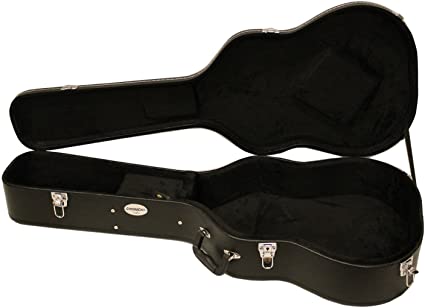
A guitar hard case offers the highest protection for a guitar.
Best Way To Store Guitar: My Recommendation
I recommend you keep your guitar on a guitar stand. This is great for beginner to somewhat experienced guitarists.
A guitar stand costs about $22 and your home will look even better when there’s a guitar on display (believe me).
Just make sure you place your guitar stand away from the sunlight and away from your air conditioning or heating system. The location is important – it’s usually at a corner where temperature remains somewhat constant.
This is a guitar stand that I have. Nothing fancy, it’s cheap and lasts a long time. It’s $22 from Amazon.
If you want a good looking guitar stand, I recommend looking into this wooden guitar stand. It’s just $25, looks beautiful but is not adjustable (not a big deal though).
If you are an experienced guitarist and start to have expensive guitars, then keeping it in a case is an absolute must. A case provides maximum protection to your guitar – away from humidity and temperature changes.
It doesn’t matter whether you keep the guitar case standing or flat. I personally have tried both and I don’t notice any difference between the two.
Here are 2 great guitar cases from Amazon that I think are great:
FAQs
Does Hanging Guitar Damage Neck?
Hanging guitar will not damage the neck. It is completely safe to hang your guitar from the wall.
Hanging the guitar from the wall is safe. It does not damage the neck and the other parts of your guitar. In my studio, I used to hang the guitar from the wall. It gives me more places to adjust the other instruments properly.
You can also hang your guitar from the wall without fearing any damage. However, make sure that the hanger is covered with soft foam. It will prevent damage to the finish of your guitar.
Is Guitar Stand Worth It?
A good guitar stand can be a great option for storing your guitar safely. It provides base support as well as a neck support. This makes a guitar stand safe for your guitar.
The guitar stand holds your guitar from both the base and neck positions. You can go with a good guitar stand in case you fear any damage. In my house, I do not prefer drilling the wall. That is why I am using a guitar stand to store my electric guitar.
If you are buying a guitar stand, be sure it is of good quality. It should be strong enough to hold the weight of your guitar. Also, it must be properly cushioned to avoid damage to the finish of your guitar.


